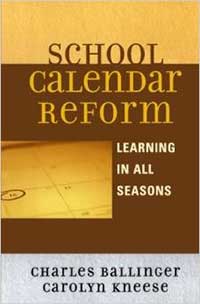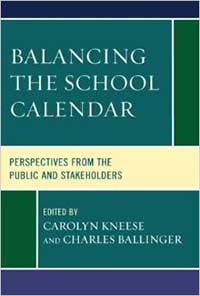Answers to the Common Questions about YRE
By NAYRE Executive Director Emeritus, Dr. Charles Ballinger
As school districts consider the move to a modified or balanced calendar, there are common issues that become an integral part of the community discussion that occurs between administrators, school board members and parents.
They are:
-
Does the calendar make a difference in the overall learning of students?
-
Can a non-traditional calendar work on the secondary level?
-
Is there a need for uniformity of calendars?
-
What role does choice in education play?
-
What is the role of NAYRE and how credible is the information it provides?
-
If YRE is such a good idea, why hasn’t it been more readily accepted
Dr. Ballinger, provides his answers to those questions:
1. The first issue is whether there is educational research that shows that calendar arrangements make a difference in the overall learning of students. Yes, there is and it is quite convincing. Interestingly, opponents of modifying and balancing school calendars usually deny that there is such research and rarely are accepting of the available findings.
The research is divided into two parts. The first part deals with summer learning loss. Educational research is very clear that there is summer learning loss because of the long summer vacation of the traditional calendar. That finding is rather consistent across many studies. The largest (and most widely accepted) study in this field of study was done by a team in the psychology department at the University of Missouri, Columbia, headed by Dr. Harris Cooper. (The study can be found in the Review of Educational Research, Volume 66, no. 3, 1996 and is entitled "The Effects of Summer Vacation on Achievement Test Scores: A Narrative and Meta-Analytic Review".) In laymen's language, the study found that summer learning loss is a reality, that all students (including the best) lose in math and spelling skills, and many, though not all, lose in reading skills over the traditional summer. Based on the research about summer learning loss, it is difficult--no, it is impossible--for an educator to defend a calendar which allows so much loss, for any reason other than as a choice for those parents who prioritize lifestyle (ten weeks of vacation) over learning (less learning loss).
The second part of the research is whether doing things differently in calendar arrangements makes a difference. There are two primary studies to look at. The first is one by Dr. Carolyn Kneese, professor emeritus at Texas A&M University, entitled "Year-Round Learning: A Research Synthesis Relating to Student Achievement." Dr. Kneese's conclusion after reviewing six research syntheses and thirty individual studies: "In summary, one may conclude from this particular review of achievement studies that there is an effective maintenance and improvement of the overall academic performance of students participating in a year-round education program in comparison to those on the traditional calendar." Note the two key words: maintenance and improvement. Maintenance keeps what has been learned and improvement adds to it. A second major study was published by a team from the psychology department at the University of Missouri, Columbia, again headed by Dr. Harris Cooper. (The article was published in the Review of Educational Research, Vol. 73, no. 1, with the title of "The Effects of Modified School Calendars on Student Achievement and on School and Community Attitudes.") After looking at over 400 studies about year-round education, and focusing on 39 school districts, Dr. Cooper's team found that the average effect size for the 39 was small, but nevertheless positive, for those schools with a modified calendar. Also, the team found that parents and staff who participated in modified calendar programs were quite positive about their experiences. That latter finding comports to our knowledge in this office that almost all opposition to a modification of a school calendar comes from those who have not experienced the calendar first-hand.
Opponents of balancing the calendar sometimes will refer to negative studies in their discussion. You should know that such studies just have not been published. More about this later in discussion of whether NAYRE's information is biased.
2. Often there is concern that a balanced (modified, year-round, or non-traditional) calendar may be problematic at the secondary level. While this is sometimes raised in a community's discussion, experience has shown that reorganizing the school year has not been a problem for high school or middle school sports, band, or extra-curricular activities in any single track calendar arrangement (as distinguished from multi-track). Since there have been more than 200 high schools and 300 middle schools in the nation on a balanced or year-round calendar, we have plenty of experience with year-round at the secondary level. One has to ask: Why the presumption that there would be a problem? In all 50 states that we are aware of, the state athletic association has language about being "enrolled" in school rather than actually being in school on the day of a game. Those regulations were written so that a basketball game can be played during the winter holidays, between Christmas and New Year's, for example, when school is not in session, or so an athlete who might have reason to be absent during a school day would still be eligible to play in an evening game. Band and extracurricular activities naturally follow whatever the school's schedule might be, so those face no complications at all. As to student employment, a good survey would determine whether any students would be affected by a calendar change. One large high school in the San Diego area did such a survey and found that fewer than 50% of their students were employed at all, and almost all of that employment was outside of and not affected by the school schedule. In the end they discovered that fewer than 5% of their student body had jobs that might be affected by a change in the school calendar, and those students could be incorporated within a work-study program during regular school hours. Student summer employment? Again, it will be a very small percentage that would be affected, since most summer employment is for those above 16 and most of those jobs are part-time and flexible. Would a Board ordinarily make a favorable decision for the 10% or so that might be affected in summer employment (an important, but not educational, consideration), or would it consider its primary duty the other 90% for whom summer learning loss is a meaningful issue?
3. Uniformity is almost always more efficient. That is a truism in business, government, religion, and school policies. A cereal company would be far more efficient if the company put out fewer kinds of cereals, but their overall revenue would likely decrease. Every dictator on earth knows that uniformity is to be cherished and enforces uniformity to the greatest degree possible. Religious leaders would like uniformity in doctrine and fewer houses of worship would cut worship costs considerably. School administrators and school board members have attended seminars that show how uniformity can cut costs. However, there is something to be said for a choice of cereals. There is something to be said for democracy, expensive and messy as it is. There is something to be said for freedom to worship as we choose, expensive though that may be. Of course, uniformity among schools in a district would be cheaper, but there is something to be said for choice even in education, since students do not all learn in the same way.
4. Choice in education is one of the hallmarks of America's stronger school systems. Most of the better systems I have come across over the years offer choices to parents whenever possible. Districts that push uniformity above all else generally decline after a short period of time
5. The National Association for Year-Round Education is an advocacy group on behalf of rethinking the school year calendar. We are an advocacy group in the same way that the National School Boards Association is an advocate for school boards, the American Association of School Administrators is an advocate for top school administrators, and the National Education Association is an advocate for teachers. All of these groups, though, must maintain credibility while advocating a particular point of view. NAYRE strives to do the same. In the article on modified school calendars mentioned above, Dr. Cooper and team asked both proponents and opponents of calendar change to send research studies about calendar change. (The Cooper team collected over 400 studies.) NAYRE sent all of which it was aware. An opposing group, Time to Learn, which in the past has been funded by the International Association of Amusement Parks and Attractions and which has made claims about negative research on year-round education, sent none. The University of Missouri team, headed by Dr. Cooper, commended NAYRE in its published article for sending a very balanced portrayal of modified school calendars. We stand on our record.
6. Some opponents will say that if year-round is such a good idea, why hasn't it been accepted more readily? This is an easy one to counter. Try these rebuttals: If democracy, which has about four centuries of existence, is such a good idea, why is it that so few countries in the world have it? Or, why is it that Christianity (or any of the other of the world's religions), with a 2000-year existence, is not universally accepted? The point is quickly made that good ideas don't necessarily achieve universal acceptance, no matter how good they may be.
As a caution, school districts should be aware, however, that opponents of calendar change to benefit student learning are not likely to be swayed by anything I have written, nor by any other factual document that a district might obtain. Year-round parents have experienced what a modified calendar can do. Most of the opponents have not. Therein is part of the problem. Schools are correct, however, to do all they can to support modification of the school calendar. Student learning will benefit because of their efforts.



